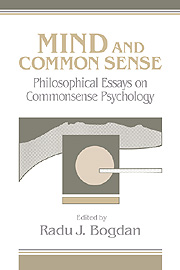Book contents
- Frontmatter
- Contents
- List of Contributors
- 1 The Folklore of the Mind
- 2 Analysis without Noise
- 3 Folk Psychology and the Explanation of Human Behavior
- 4 Methodological Reflections on Belief
- 5 Consciousness and Content
- 6 The Inevitability of Folk Psychology
- 7 How is Eliminative Materialism Possible?
- 8 The Long Past and the Short History
- 9 Common Sense Naturalized: The Practical Stance
- Index
9 - Common Sense Naturalized: The Practical Stance
Published online by Cambridge University Press: 24 September 2009
- Frontmatter
- Contents
- List of Contributors
- 1 The Folklore of the Mind
- 2 Analysis without Noise
- 3 Folk Psychology and the Explanation of Human Behavior
- 4 Methodological Reflections on Belief
- 5 Consciousness and Content
- 6 The Inevitability of Folk Psychology
- 7 How is Eliminative Materialism Possible?
- 8 The Long Past and the Short History
- 9 Common Sense Naturalized: The Practical Stance
- Index
Summary
If commonsense psychology is the solution, what was the problem?
Introduction
Almost everybody believes, but nobody has conclusively shown, that commonsense psychology is a descriptive body of knowledge about the mind, the way physics is about elementary particles or medicine about bodily conditions. Of course, commonsense psychology helps itself to many notions about the mind. This does not show that commonsense psychology is about the mind. Physics also helps itself to plenty of mathematical notions, without being about mathematical entities and relations. Employment of notions about the mind does not by itself establish the nature and business of commonsense psychology. To find out what the latter's notions are about requires finding out what they are for. To find out what they are for, we should start by asking who employs them in what contexts and for what reasons. If we consider seriously these questions, we should not be too surprised to find out that:
A subject is an agent busily pursuing his worldly interests. In the process, he encodes, operates on, can be read for, and often deliberately conveys information about his current as well as past or future cognitive and behavioral states, and about the world around him, as it was, is, and could be.
[…]
- Type
- Chapter
- Information
- Mind and Common SensePhilosophical Essays on Common Sense Psychology, pp. 161 - 206Publisher: Cambridge University PressPrint publication year: 1991

